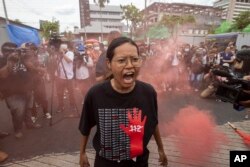The party that won Thailand’s general election in May stands a good chance of being left out of the country’s next government when parliament meets again next week to pick a prime minister, analysts say, raising fears of a return of mass protests.
“That’s where the trend is going,” Thitinan Pongsudhirak, a political science professor at Thailand’s Chulalongkorn University, told VOA on Thursday.
Surprising most pundits, the youth-facing Move Forward party won a plurality in the May poll with promises of easing the royalist, military establishment’s decades-long grip on political power. It landed 151 of the 500 lower house seats up for grabs, trouncing the conservative, pro-military parties backing the aging ex-generals who seized power in a 2014 coup.
In the days after the poll, Move Forward cobbled together an eight-party coalition holding a total 312 seats in the House of Representatives. On July 13, however, its candidate for prime minister, Pita Limjaroenrat, failed to win the needed majority in a joint session of the elected House and military-appointed Senate.
At their session on Wednesday, the same senators and conservative lawmakers refused to even vote on Pita again, citing rules that prevent a failed motion from being made twice.
During debate, those opposing Pita’s bid mostly railed against Move Forward’s vow to amend Article 112 of the Criminal Code, a controversial royal defamation law that metes out up to 15 years in jail for insulting the king, his heir or regent.
Pheu Thai to nominate candidate
With Pita out of the running, the bloc has agreed to let the second-largest party in the group, Pheu Thai, nominate its own candidate for prime minister when parliament meets again July 27. That candidate is expected to be real estate tycoon Srettha Thavisin.
To succeed where Pita failed, though, analysts say Pheu Thai will likely have to jettison Move Forward from the bloc to win over enough conservatives and senators.
“It will not be surprising if Pheu Thai elbows out Move Forward by making proposals that Move Forward cannot accept, such as abandoning or retreating on 112. And therefore, Move Forward will be kind of forced into the opposition. Pheu Thai will then proceed to form a coalition with the other parties, including the pro-military parties,” said Thitinan.
Srettha has “no chance” of winning Thursday’s expected vote with Move Forward on board but a good one without it, agreed Paul Chambers, a political science lecturer at Thailand’s Naresuan University.
Royalists fear that amending the defamation law to weaken it “opens the door” to doing away with the law altogether, he said, a prospect that is “just anathema to them.”
Meanwhile, critics of the law accuse the government of misusing it to stifle calls for basic democratic reforms; over 200 people have been charged with violating Article 112 in the past three years.
“The conservatives and military draw much of their legitimacy from their reputation as defenders of the monarchy, which as an institution is still revered and respected by many sections of society,” said Harrison Cheng, a Singapore-based analyst and director for consultancy Control Risks.
“They suspect that Move Forward’s proposed amendment is only the first step in a broader plan to dilute monarchical prestige and prerogatives, which in turn would also have negative repercussions for their own status and powers,” he told VOA.
Like Chambers and Thitinan, Cheng said Pheu Thai was more likely than not to form a new coalition, minus Move Forward, to secure a win for Srettha Thursday.
“Move Forward has also indicated that it is prepared to play the long game and remain in the opposition instead of compromising on its plan to amend the lèse-majesté law,” he added.
Ambitious changes on hold
The analysts said that means Thailand, for now, will see few, if any, of the more ambitious changes that Move Forward campaigned on come to fruition.
Those proposed changes included ending military conscription, reallocating a share of defense spending to social programs, and injecting more competition into sectors of the economy long dominated by sometimes just one or two well-connected firms.
The analysts also said shunting Move Forward into opposition is likely to mean a return of the mass street protests of 2020 sparked by the prosecution and ultimate dissolution of Move Forward’s predecessor party, Future Forward. In those demonstrations, crowds of frustrated young men and women in the hundreds and sometimes thousands were repeatedly met by riot police with water cannons, tear gas and rubber bullets.
Cheng said Thailand could be in for months of renewed protest if Move Forward is shut out of the next government by the military-appointed Senate and the conservative parties it soundly defeated in the election. If the protests get big enough, Chambers said, the military might even step in and declare martial law; it has already staged two coups in as many decades, 12 in the past nine.
Thitinan said the next wave of protests would probably be more modest than the last, though, unless the courts dissolve Move Forward altogether, disenfranchising its 14 million voters in a stroke.
Party faithful fear the stage is already being set.
Earlier this week, the Constitutional Court suspended Pita from parliament while it considers a complaint that he ran for election while owning a fraction of a TV station that has not broadcast in over a decade. Thai law bars candidates from owning shares in an active media company.
In a separate and potentially more perilous case, the court recently accepted a petition accusing Move Forward of violating the constitution, which holds the king inviolable, merely for proposing to amend the royal defamation law. If found guilty, the court could order the party dissolved.
“They have to think a lot about that, because when they dissolved Future Forward in 2020, they got a yearlong protest,” Thitinan cautioned. “Dissolving Move Forward, as the largest winning party, will lead to social unrest, and it will be ferocious.”






